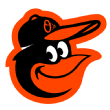The Hot Stove season, circa 2018-19, isn't all about Bryce Harper's and Manny Machado's free agency. But let's face it: Most of it is. Those are the names that are going to keep baseball-starved eyes glued to Twitter feeds over the next few weeks.
You can argue that the dual free agency of Harper and Machado is one of the best one-two punches we've had in any market since free agency got rolling in the mid-1970s. Part of it is due to their accomplishments and part of it is due to their age, which I write as singular because they were both born in 1992, about 3 1/2 months apart. Their baseball age in 2018 was 25, which means they hit the open market with plenty of prime seasons ahead of them.
There have been only a handful of instances where stars of this level have hit free agency at the same time. Well, that is if you cheat a little on Harper, whose three-year WAR at baseball-reference.com is a modest 7.5. Personally, I think he's better than that, rating somewhere between his epic 10-WAR season of 2015 and 4.7-WAR campaign of 2017. His four-year average, even given his down years of 2016 and 2018, is 4.4, so using that as the basis for this comparison raises his three-year value to 13.1.
Simple, 10-year WAR projections -- with Harper at that level -- yield this list of the top five one-two free-agent punches over the years:
1. 2000, 107.8 (Alex Rodriguez, Mike Hampton)
2. 1992, 104.7 (Barry Bonds, Greg Maddux)
3. 2004, 79.9 (Adrian Beltre, Carlos Beltran)
4. 2018, 79.4 (Manny Machado, Bryce Harper)
5. 1986, 79.2 (Tim Raines, Rich Gedman)
Remember, to get on this list, you need to be both good and young, which is why I'm using 10-year projections. Whatever you might think of Machado and Harper, they certainly fit those qualifications.
Where will they end up? Who knows? Rather than making that prediction, I'm going to look at where they best fit. That question is about much more than talent. It's about payroll commitments and ceilings, assessments of where teams are in the contention cycle, which prospects teams have in the pipeline at which positions, and which stars are already on the roster. Clearly, in a vacuum, Machado and Harper make almost any team better. But that doesn't mean they make sense for every team.
To assess the fits, I looked at the payroll outlook for each club using Cot's Contracts, prospect lists, my own rating of a team's contention status and luxury-tax considerations. For each team, I considered whether it would be better to sign Machado, Harper, both or neither.
Verdict: Neither
The Diamondbacks reupped with Eduardo Escobar on a three-year, $21 million deal early in the offseason, but that contract will be a highly tradable asset. The problem for Arizona is that with Patrick Corbin and A.J. Pollock on the market and Paul Goldschmidt entering the last year of his deal, the Diamondbacks will have to spend just to hang in the middle. They don't have the impact prospects that would allow them to fill in the gaps with value contracts. Arizona could hang on for another year, but chances are a reset is coming soon.
Verdict: Both
Why not? The Braves have around $80 million to spend just to get to a moderate uptick in payroll. They have a number of controllable core talents in place and coming down the pike. And they have a deep set of pitching prospects, which will serve them well in the trade market and in filling in gaps on the big league staff. Splurging on either or both of Harper and Machado is a dream scenario for Atlanta. Whatever the outcome, the Braves are perfectly positioned.
Verdict: Neither
This probably doesn't require much explanation. No team has further to go to get from here to there than the Orioles. Right now, it's not immediately clear who would even be making pitches for Machado or Harper. Deciding that might be a nice first step.
Verdict: Neither
There's no place to put Harper. Well, I guess there's always a place for a player of that caliber, but with Jackie Bradley Jr., Mookie Betts and Andrew Benintendi in place, why bother?
There's more of a case for Machado, but the Red Sox have a young third baseman in Rafael Devers and a foundation piece at shortstop in Xander Bogaerts, who won't hit free agency until after the 2019 season, barring an extension. Boston's top prospect, Michael Chavis, also is an infielder, though he isn't a shortstop.
The champs can sit this one out.
Verdict: Neither
You can make an argument for either Machado or Harper here, but given the amount of money on the books and the coming paydays for Kris Bryant and Javier Baez, among others, it's hard to see how it would work without an influx of cost-controlled talent that the Cubs simply don't have. Bryant is a wild card. If the Cubs' read on Bryant is that he isn't likely to stay for the long term, that changes things considerably.
The Cubs seem fairly boxed in for this Hot Stove season, but they have some flexibility moving forward.
Verdict: Both
The White Sox have a wide-open payroll with only Tim Anderson on anything resembling a long-term veteran contract. Chicago's high-water payroll mark has been about 70 percent of the tax line. The 2019 tax line will be $209 million, and the White Sox have a projected pre-free-agency payroll of about $54 million. Sitting at 80 percent of the tax line would give Chicago a 2019 ceiling of $168 million -- $114 million of annual salary to invest. The White Sox could splurge for Machado and Harper and still have room as the roster develops.
Verdict: Neither
The Reds have enough payroll room to add one of Machado or Harper, but it would leave them strapped to fill out what is a largely flawed roster. I love the early approach by Dick Williams this offseason. By adding a premier pitching coach in Derek Johnson and a top hitting coach in Turner Ward, the Reds can better assess what they have in terms of big league producers in the system. That needs to get sorted out first and foremost before Cincinnati starts building on guesses and wishes.
Verdict: Neither
Cleveland can keep most of its core together through 2021, then it starts to get murky. Any splash in free agency would need to be timed with the remaining years of certainty for the likes of Francisco Lindor, Jose Ramirez, Corey Kluber and Trevor Bauer. With Machado and Ramirez primed to draw decade-long commitments, it's just too much risk for a team such as the Indians to enter into a deal that long. It makes more sense for Cleveland to look at impact free agents who can be had on shorter deals, such as Josh Donaldson or A.J. Pollock.
Verdict: Harper
The Rockies have to factor in an extension for Nolan Arenado, who is due to hit free agency after the 2019 season. That's tops on the to-do list for Jeff Bridich and is a prerequisite for pursuing Harper, who is a career .387 hitter at Coors Field. The Rockies' excellent young pitching is mostly under team control for the near future, and they have in-house replacement options for free-agent second baseman DJ LeMahieu, so with Arenado and Trevor Story in the fold, there's no glaring need for Machado. However, there's nothing preventing an all-in pursuit of Harper.
Verdict: Neither
Too soon. The Tigers haven't established enough of a talent base in the minors, much less in the bigs. Plus, they will be paying a combined $55 million to Miguel Cabrera and Jordan Zimmermann over the next two seasons, plus another $92 million to Cabrera in the three seasons after that. Adding a $30-plus-million-per-year megadeal to that mix just does not compute.
Verdict: Neither
The news that Lance McCullers Jr. might miss the 2019 season means that even more of the Astros' offseason focus will be on keeping their starting rotation among the elite. If Machado or Harper could be had on one- or two-year deals, then you could see a fit here. That's more true of Harper, given the young talent in the Astros' infield. But the long-term payroll in Houston will need to be headed up by Jose Altuve, George Springer, Carlos Correa and Alex Bregman. There's no room for Machado or Harper on the longer horizon.
Verdict: Neither
Not the way the Royals operate.
Verdict: Harper
The Angels' payroll would be unsightly for a couple of years, but consider this an investment in helping convince Mike Trout that Orange County is his forever home. Albert Pujols has three years left on his deal, then the Angels can breathe a little. But they can't run out the clock on that deal because Trout has two more years before free agency. For Harper, it's a chance to move back west to a big-market team with a small-market spotlight. In the AL, he can DH and spend time at first as the years pile up.
Verdict: Harper
The Dodgers have some familiarity with Machado, and for all the noise around him during his half-season in L.A., it was my impression that within the clubhouse he fit well. Still, Corey Seager will be back at shortstop, and the Dodgers could use a premier power threat. Harper fits the organizational philosophy, and Dodger Stadium is a friendly home run park for lefty hitters. Los Angeles has plenty of payroll flexibility to outbid everyone for Harper, Machado or both -- not that they will use it.
Verdict: Machado
Miami's committed payroll beyond 2020 is a big fat zero. Rumors regarding a possible trade of star catcher J.T. Realmuto suggest that a Machado pursuit is unlikely. To be fair, it might be too soon to expand the payroll. But this is the kind of splash the Marlins need to make, so to speak, for their fans. Machado, a Miami native, could be the face of the franchise for the next 10 years -- if he could stand the hit his numbers would take playing in that ballpark.
Verdict: Neither
The Brewers can be a player in the free-agent market, and given the possibilities for regression on their roster, it might not be a bad idea to go that route. That said, I don't think a team that might max out at around a $120 million payroll can afford to concentrate a quarter of that on anyone. If Milwaukee spends, it won't be for 10 years of Machado or Harper.
Verdict: Harper
The Twins have no committed dollars beyond next season. None. Given that Minnesota's payroll ended up at around $128 million last season, they should be able to bid on just about any free agent in the market. I like Harper for them over Machado because the Twins have some nice middle-infield options on the way, and their lineup could use a pure home run threat such as Harper. Alas, even if the Twins offered Harper the money, it seems doubtful that he'd take it.
Verdict: Both
This is a New York team, for goodness sake. You put Harper and Machado in front of a Jacob deGrom-Noah Syndergaard-led rotation and you've got as much star power as any team in the majors. The first year of doing that might put the Mets over the tax line, but they have other deals coming off the books after that, such as those of Jason Vargas, Todd Frazier, Juan Lagares and Anthony Swarzak. In another year, you lose Yoenis Cespedes, David Wright's residual dollars and Jay Bruce. If you can then keep deGrom and Syndergaard in the fold, you can augment from within for the next half-decade at least.
Verdict: Machado
Payroll space isn't the issue; positional space is. New York has Aaron Judge, Aaron Hicks and Giancarlo Stanton in the outfield just for starters, plus guys such as Brett Gardner (for one more year) and Clint Frazier in the wings. But you can build the infield around Machado. Miguel Andujar can move to first or stick at third if his glove improves, and Didi Gregorius eventually walks. Gleyber Torres can play second base for the next decade. Machado, Judge, Stanton ... it's frightening.
Verdict: Neither
It's possible that the A's could become a big-market team. Goodness knows, there is plenty of population density and high earners in the Bay Area to make that happen, even on the Oakland side of the water. But there is too much uncertainty to go in on a free-agent deal for one player who will likely exceed $300 million. Where will the A's play? What happens when they are no longer a payee in the revenue-sharing system? For Billy Beane, just named as the first official Executive of the Year, it'll be another winter of business as usual.
Verdict: Both
This has been the plan all along, right? Adding Machado and Harper would give the Phillies the flexibility to package some of their younger position players to fill pitching gaps. And not for nothing, this would give the Phillies a devastating lineup. An added bonus: Adding Machado and Harper has the double benefit of keeping those two away from the Phils' NL East rivals, most of whom could be considered logical destinations for the star free agents.
Verdict: Neither
As with all the small-market teams, signing high-dollar players such as Machado and Harper would mean just too much concentration of payroll on one roster spot. The Pirates have to develop players of that ilk, not sign them. This has been true since the days of Barry Bonds.
Verdict: Neither
San Diego is rich with middle-infield prospects, and while the outfield is more of a muddle, it's hard to envision Harper going to such a difficult home run park. For better or worse, San Diego has already anointed Eric Hosmer and Wil Myers to head up its payroll the next few years.

Verdict: Neither
Yes, the rumor mill is hot with Harper-to-the-Giants talk. This is about what the Giants should do, not what they will do. Like the Orioles, San Francisco must first identify its long-term decision-maker. (Dodgers GM Farhan Zaidi would make a great choice, but he's also in a good spot in L.A.) Whoever that is must make the difficult decision to build from the ground up. The Giants have the resources to shorten the rebuild window, but they have to make the decision to reset first. Signing Harper, or Machado, would be the antithesis of doing that. It does nothing to heal an organization in decay.
Verdict: Neither
The rumor is that the Mariners are looking to hit reset, and that might be for the best. Last year's team was an amazing work of smoke and mirrors. But much of the payroll is tied up in aging and under-producing players, and the minor league system is mostly empty. Given the strength of their division, it's a good time for the Mariners to ease up on the throttle for a season or two. Then again ... it's been a long time since the Mariners played into October.
Verdict: Machado
The Cardinals haven't had a lot of success with their free-agent splashes in recent years, but the organization remains in good shape. Adding a big salary would make for a team-record payout in 2019, but it loosens up after that. Besides, the Cardinals should be able to act as an upper-middle-class outfit. They have the organizational talent to keep the payroll in a reasonable range and a gaping need for a premier power threat. Either Harper or Machado works, but Machado is a better fit for the ballpark.
Verdict: Neither
Let's take the 2019 minimum salary of $555,000 and apply it to 23 roster spots. That's $12.765 million. The Rays' highest season-opening payroll was last season's $76.4 million. The difference between those two figures is $63.635 million. There's a chance that Machado and Harper will combine to make more than $63.635 million in each of the next 10 seasons.
Verdict: Harper
The Rangers need pitching in the worst way, but given how difficult it is to spend big on hurlers via free agency, a splash for a lineup anchor such as Harper might wake up the fan base. One issue is that while Harper would light up Rangers Ballpark in Arlington like a pinball machine, Texas will be playing there for only one more season. It has been a while since the Rangers went big via free agency, but this is the franchise that once signed a pre-peak Alex Rodriguez to a 10-year deal.
Verdict: Neither
It's really too early in the rebuild for the Blue Jays to spend heavy on a star free agent. Besides, beginning at some point next season, they'll have Vladimir Guerrero Jr. around to rev up the fan base. The Blue Jays have to be careful with their spending while working on the long-term viability of the Rogers Centre. Plus, last season Toronto took a heavy hit in attendance. This is a good time for the Jays to let things grow organically.
Verdict: Harper
Harper has a chance to be as closely associated with the Nationals as Clayton Kershaw is with the Dodgers. This is the winter we find out if that is going to happen. For most of the past couple of years, it has been widely assumed that it won't. And there are others who currently say it shouldn't, not with the emergence of Juan Soto and the likely ascension of Victor Robles. Me, I'm a sucker for one-franchise players and would love to see Harper stick around D.C. But with the megadeals of Stephen Strasburg and Max Scherzer eating up payroll, and the Nats already working on a two-year streak of luxury tax payments, the investment required to keep Harper might not make any fiscal sense.





























